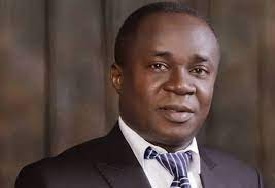A Professor of Finance and Capital market, Uche Uwaleke, has stressed the need for the government to unlock the huge potential of long-term financing inherent in the capital market and ensure borrowings tied to infrastructure bonds.
Uwaleke stated this at the 2023 conference of the Capital Market Correspondents Association of Nigeria (CAMCAN) held in Lagos at the weekend.
He said this became necessary for the nation’s economy to grow steadily at 16 per cent per annum over the next six years to attain the projected $1 trillion economy by 2030.
Uwaleke stated that with the nation’s infrastructure investment need which had continued to widen, and government debt profile which is substantially high, mobilising long-term financing through the capital market and deploying domestic market borrowings into infrastructure bonds had become critical to achieving the target.
Speaking on the theme: ‘Leveraging Capital Market in Financing The National Development Plan’, Uwaleke said despite the creation of the development plan designed to tackle the nation’s huge infrastructure gap, Nigeria is still rated one of the lowest stock of infrastructure to GDP among emerging economies.
To narrow the gap, the government through the creation of the National Integrated Infrastructure Master Plan, had proposed that Nigeria needed to invest $3 trillion in infrastructure over the next 30 years and $100 billion annually.
This translates to a yearly investment of over N42 trillion which constitutes more than the size of the total annual budgets of the federal and sub-national governments.
Financing this huge infrastructure gap presents a formidable challenge to the government given Nigeria’s low revenue-to-GDP ratio of less than 10 per cent making inevitable the capital market route.
However, Uwaleke pointed out that the nation’s capital market is currently beset with myriads of challenges, which had continued to constrain its full development despite giant strides achieved in the last two decades.
He noted that the extent to which the Nigerian capital market could facilitate economic development is a function of its level of development.
Uwaleke listed some of these challenges to include: a weak domestic economy, poor savings mobilisation, the small size relative to the GDP, and market concentration among others.
He noted that economic growth in Nigeria had been weak, especially in recent times, owing in part to the overreliance of the economy on crude oil.
According to him, while the unemployment rate has grown from 27.1 per cent in Q2 2020 to 33.3 per cent in Q4 2020, the situation is made worse by rising inflation which results in negative real rates of return on investments in the capital market.
He added that the pursuit of low inflation and GDP growth had been hindered by a huge infrastructure gap, even as infrastructure stock represents only 35 per cent of the GDP far below that of peer countries.
Data from the National Bureau of Statistics inflation rate surged to 27.33 per cent in October, representing 0.61 per cent from the 26.72 per cent that was recorded in September.
Also, on a year-on-year basis, the headline inflation rate was 6.24 percentage points higher compared to the rate recorded in October 2022, which was (21.09 per cent).
This showed that the headline inflation rate (year-on-year basis) increased in October 2023 when compared to the same month in the preceding year (October 2022).
According to the data, major contributors to the increase in inflation were food and non-alcoholic beverages, housing, water, electricity gas and other fuel, clothing and footwear, and transport among others.
Uwaleke stressed the need to address the issue of rising cost of food prices, noting that this has continued to drive stagflation, a situation of high inflation with weak and tepid economic growth.
He urged the government to focus more on reviving the manufacturing sector and agriculture as key drivers of sustainable economic growth.





















